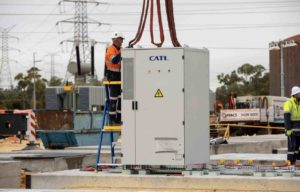Western Australia’s McGowan government has unveiled more plans to try and make the state a centre of the global battery storage boom, and harness “a once in a lifetime” economic opportunity as the shift to electric vehicles and distributed renewables gathers speed.
The plans – or rather plans for more plans – were unveiled on Friday, with the launch of the state’s long-awaited Future Battery Industry Strategy.
The strategy was put together by the government’s Future Battery Industry Ministerial Taskforce in consultation with industry, research organisations and the community.
It plays to the state’s strengths, with a focus on unlocking the lithium-ion battery value chain, including its vast reserves of lithium and other high value metals and minerals crucial to booming demand.
According to the FBIS web page, Western Australia is “the global leader” in lithium production, has the world’s fourth largest vanadium and manganese resources; the second largest reserves of cobalt; and the largest nickel resources.
It also produces non-battery minerals used to make EVs and energy storage systems, including rare earth elements used in the production of electric motors.
All of these metals and minerals are in increasingly high demand – according to a report published last May by Bloomberg New Energy Finance, demand for copper, high-purity nickel, cobalt and lithium used in the manufacture of EV battery packs is expected to rise 31 times, 42 times, 19 times and 29 times respectively out to 2030.
A separate report, published in January 2018 by the Association of Mining and Exploration Companies, warned Australia must act quickly and decisively to take advantage of its leading position in the global lithium resources market, or risk missing out on what could be a $2 trillion value supply chain.
But the WA Labor government is not rushing in to anything. The Strategy mostly recommends the development of further strategies; starting with an “investment attraction” plan, to develop and strengthen relationships with investors and manufacturers in global battery and EV supply chains.
It also promises to fast-track the establishment of new battery projects in the state, by assisting and supporting them through the approvals process.
And the McGowan government has committed $6 million towards a Future Battery Industries Cooperative Research Centre, should it be successful in its bid to host the facility in Perth.
The plan is also to help fill current and future skill gaps in the state, to facilitate access to infrastructure and funding for battery technology SMEs, and to “explore initiatives” to increase the uptake of batteries across the state and globally.
“These include opportunities through assembly, installation and management of energy storage systems,” a statement said.
“The unprecedented growth of the future battery industry represents a once-in-a-lifetime opportunity for Western Australia,” said WA premier Mark McGowan in comments on Friday.
“Our Future Battery Industry Strategy will drive the development of the Western Australian battery materials industry that will create local jobs, contribute to skills development and economic diversification, and maximise benefits to regional communities.
“This is an exciting opportunity for Western Australia to be recognised as a world-leading producer and exporter of future battery materials, technologies and expertise, with huge potential for industry growth and job creation across the battery value chain.”
State mines and petroleum minister, Bill Johnston, said the Strategy was about building on WA’s expertise in the resources industry, and moving further along the value chain into downstream processing activities.
“Western Australia has all the battery minerals you need to make batteries and energy technologies, we also have a stable and robust economy with low sovereign-risk, and we’re world-leaders in research and development,” Johnston said.
The unveiling of the strategy has been welcomed by mining and energy industry groups in the state, but the W.A. Greens has called for a similar focus on reforming the state’s energy market, and incentivising the uptake of clean energy technologies.
Alongside New South Wales, Western Australia is the only remaining state in Australia yet to adopt a renewable energy target. It also lacks any real strategies to drive the uptake of electric vehicles or household batteries.
“It’s positive to see the McGowan government has acknowledged the need to bring battery storage into the market, but we need to ensure that these technologies can be used in our local energy grid,” said Greens spokesperson for energy, Tim Clifford, on Friday.
“Given the growing demand for battery storage systems and clean, green societies, it is pertinent the State Government reforms the energy market to ensure all Western Australians can take advantage of these new technologies.
“WA desperately needs energy reforms. We need energy security, lower electricity prices, and to re-power our economy by transitioning to clean renewable energy,” Clifford said.
“The advantage we have in WA is that we have control over the grid, so the state government has no excuse not to reform the sector to serve the public better.”










